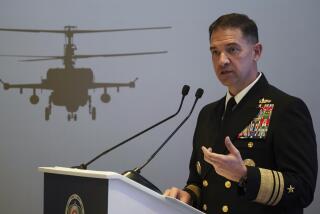NEWS ANALYSIS : Marines’ New Slogan: ‘The First to Help Out’ : Military: Humanitarian mission in Somalia highlights the shift away from traditional role as the ‘first to fight.’
- Share via
The humanitarian mission in Somalia symbolizes the Marine Corps’ new global strategy, transforming the service hailed as “first to fight” into the “first to provide assistance.”
Operation Restore Hope in Somalia is the first proving ground for the corps’ new military strategy, experts say. Developed after the thaw of the Cold War, the corps’ new mission was outlined in a white paper titled “From the Sea” released by Navy and Marine officials last September.
Under the modified strategy, the Marines’ role as peacekeepers comes as the focus shifts from global military threats to “regional challenges and opportunities,” including “humanitarian assistance and nation-building efforts” in Third World nations, the report stated.
While some officials presented the change in strategy as a realistic response to changing world dynamics, other experts said they view the directive as a shrewd move on the part of Navy and Marine officials to compete with the Army and Air Force for shrinking defense dollars.
“The humanitarian role is one they’re going to be attracted to in order to justify their budget,” said John Henshaw, a defense expert at the Harry L. Stimson Center think tank in Washington. “Generally speaking, in the future the focus will be on regional conflicts, particularly coastal operations where the Navy and Marines can work well together. And humanitarian assistance missions are going to play a major part in the new strategy.”
Henshaw praised the Marines and Navy for thinking far enough ahead to carve out a purpose that requires their troops’ participation in future crises that erupt in nations that have coastal waters.
Many of today’s regional conflicts are erupting along the world’s coasts, as illustrated recently in Kuwait, Liberia and Somalia. A study by Marine Corps researchers projected that in the next 20 years about 80% of the populations of developing nations in Latin America, Africa and the Pacific Rim will be concentrated in urban coastal regions.
While the new Marine Corps strategy became official only months ago, the change actually began evolving in 1991, when about 8,000 Marines and eight Navy ships, assisted by Air Force and Army Special Forces teams, were rushed to storm-ravaged Bangladesh to participate in Operation Sea Angel.
Bangladesh, one of the world’s poorest countries, was hit by a cyclone in April, 1991. The resulting high winds and tides--most of the country’s coastal areas are about two feet above sea level--killed an estimated 100,000 people and flooded much of the country.
“Bangladesh happened more than a year before the new strategy was adopted. But what we did in Bangladesh was not much different than what we’re doing in Somalia,” said former Marine Lt. Col. Jim Vance, who acted as a spokesman for the Marine relief mission to the Asian country.
“The infrastructure was very similar to Somalia’s,” he said. “There was a Byzantine system for the delivery of goods, roads were virtually nonexistent, and communication was limited. . . . There was food stored in the country’s warehouses, but they lacked the ability to deliver them to the outlying countryside.”
Both humanitarian operations in Bangladesh and Somalia fit in nicely with the Marines’ new global strategy, said Henshaw, adding, “Clearly, the Marines were given a major role in Somalia because they were already on station. They were the appropriate forces for the initial task of taking the port and airport (at Mogadishu).”
Marine officials said the troops who responded in Bangladesh were en route from the Persian Gulf War when they were diverted to assist the stricken population.
Lt. Kevin Bentley, Marine spokesman at Camp Pendleton, said at least one of three expeditionary units from the base is deployed in the Western Pacific Ocean at all times. Typically, deployments last for six months. “What we’re doing in Somalia is nothing new really. We’ve been doing this in one way or another as long as we’ve been ‘forward-deployed.’ ”
Earlier this year, the Marine Corps celebrated the 50th anniversary of the Battle of Guadalcanal by sending a flotilla of Marines to participate in a ceremony at the South Pacific island. Along the way, the Marines stopped in Fiji, New Caledonia and Tonga, where they provided humanitarian relief and medical assistance to the local populations, Bentley noted.
More to Read
Sign up for Essential California
The most important California stories and recommendations in your inbox every morning.
You may occasionally receive promotional content from the Los Angeles Times.













